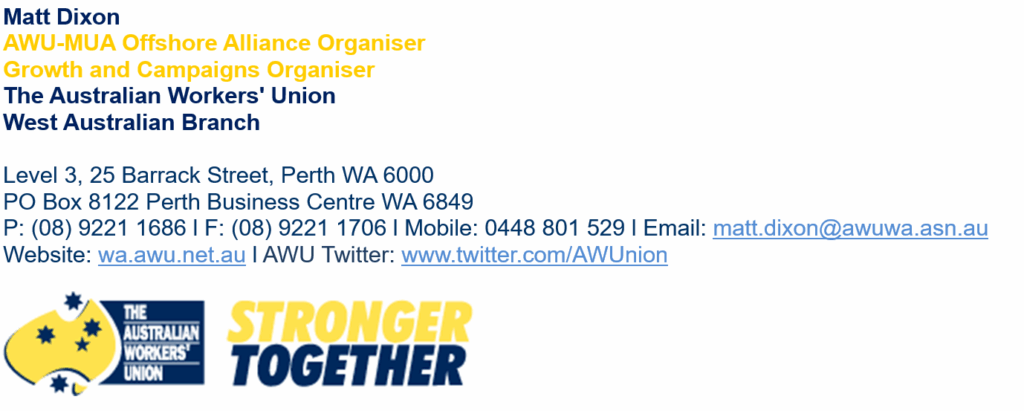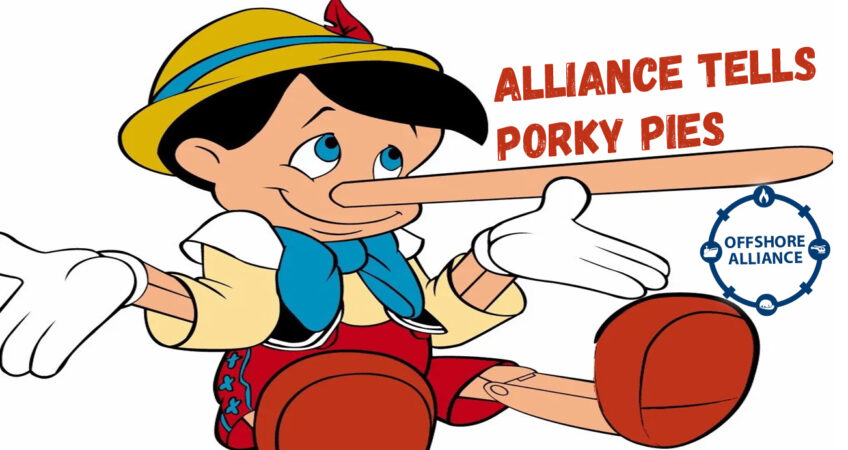The Offshore Alliance’s current criticism of industrial agreements forged under past frameworks belies its own central role in negotiating and endorsing those very deals. Since 2014, the Alliance—comprised of the Australian Workers’ Union (AWU) and the Maritime Union of Australia (MUA)—has not only cooperated closely with the Australian Manufacturing Workers’ Union (AMWU) and Electrical Trades Union (ETU) but has also been instrumental in shaping the industrial landscape it now seeks to distance itself from.
Evidence from a series of internal union communications and corporate correspondence reveals that the Offshore Alliance, far from being a peripheral player, was actively involved in shaping industrial agreements that it now seeks to blame others for.
Active Since 2014
An email from 2014 confirms the Alliance’s operational status, with Matt Dixon—then listed as the AWU-MUA Offshore Alliance Organiser—communicating with Brunel over a dispute initiated by the AMWU regarding standby payments on the vessel Audacia. Dixon’s communications throughout 2014 and 2015 show a pattern of involvement with multiple companies including Brunel, Saipem, Skilled Offshore, and McDermott Australia.

These exchanges reveal:
- Member representations and dispute interventions in early 2015, with Dixon frequently acting as the point of contact.
- Joint invitations and participation in vessel inspections and crew inductions throughout 2015, reinforcing the Alliance’s operational integration with employers and the AMWU and ETU.
- Signing of project MOUs as early as 2014, underscoring formal recognition of the Alliance by major offshore operators.
- Detailed involvement in Skilled Offshore Ichthys Project Agreement negotiations in 2015, with documentation showing correspondence between Dixon, AMWU’s Glenn McLaren, ETU’s Les McLaughlan and other union officials.
- Submission of a Protected Action Ballot Order (PABO) application, made by the AMWU and co-signed by the ETU and then-AWU State Secretary Stephen Price, supporting the legitimacy and seriousness of the Alliance’s industrial engagement.
- A coordinated legal challenge at the end of 2015 to block approval of the McDermott’s enterprise agreement—an effort that initially succeeded but was later overturned by the Fair Work Commission’s full bench.
Given this extensive involvement, the Offshore Alliance’s attempt to discredit legacy agreements as substandard is not just misleading—it is hypocritical. Many of these agreements were not only endorsed by the Alliance but actively shaped through its own bargaining representatives.
In one example, Dixon explicitly stated the AWU would defer its position to the AMWU in a negotiation with Brunel because the AMWU held the majority of members. This clearly signals a collaborative approach, not a divergent one. Yet now, the Alliance seeks to place blame squarely on the AMWU, disowning its own role in the decisions made.
A Tarnished Political Legacy
Adding further complexity is the subsequent political career of Matt Dixon. After his time with the Alliance, Dixon served as State Secretary of the WA Labor Party. He resigned in late 2019 following an internal investigation into the misuse of funds—specifically, that money raised by WA State MPs had been improperly funnelled to support Bill Shorten’s unsuccessful federal campaign. More on this.
Conclusion
The Offshore Alliance’s selective memory and disavowal of its own history in shaping the industrial agreements it now derides are not only disingenuous—they undermine its credibility. The Alliance’s involvement in 2014, its cooperation with the AMWU and ETU, and its central role in negotiations, legal challenges, and strategic decisions throughout the mid-2010s reveal a far more complex and complicit legacy.
This inconsistency reveals a deeper issue: the Alliance appears to be rewriting history to fit a narrative that absolves it of responsibility, despite ample evidence to the contrary. Public criticism of legacy agreements might serve short-term membership recruitment, but it also risks undermining trust in the unions’ past and present bargaining integrity.

